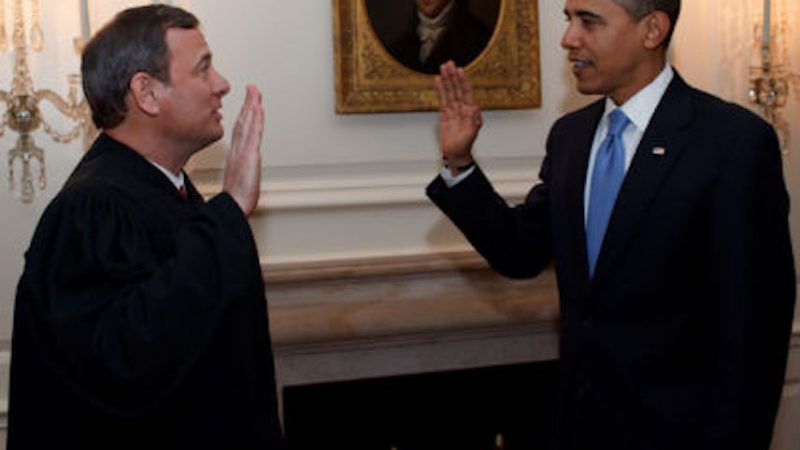The New Challenge to Obamacare
Is this a chance for the Supreme Court to correct its constitutional mistake?

Readers may be familiar with a new constitutional challenge by 20 state attorneys general to the Affordable Care Act, which Ilya blogged about here. Their argument, in a nutshell, is that with the amount of the penalty for failing to have health insurance now set to zero, the individual insurance "requirement"--AKA the "individual mandate"--can no longer be justified as a tax. This is so because one of the essential characteristics of a tax is that it raises at least some revenue for the government. For this reason, the "saving construction" employed by Chief Justice Roberts no longer applies, as it is no longer even a "reasonably possible" reading of the insurance requirement, which now raises no revenue.
On this claim, the AG's are on very strong ground. To the extent they are correct, the NFIB v. Sebelius was a bigger victory than we realized when it was decided, as it left the insurance mandate susceptible to being killed off in this way via reconciliation.
Because this constitutional claim makes sense, the attention will turn to the issue of standing and, perhaps, mainly to severability. If the insurance requirement is invalidated, does that bring down the rest of the Affordable Care Act? While we argued that the entire ACA was inseverable from the mandate, the Obama administration contended that--based on the Congressional findings--only the guaranteed issue and community rating provisions are inseverable:
Congress's findings establish that the guaranteed-issue and community-rating provisions are inseverable from the minimum coverage provision. Congress specifically found that in a market with guaranteed issue and community rating, but without a minimum coverage provision, "many individuals would wait to purchase health insurance until they needed care." 42 U.S.C.A. 18091(a)(2)(I). . . . Congress therefore expressly found that the minimum coverage provision is "essential to creating effective health insurance markets in which improved health insurance products that are guaranteed issue and do not exclude coverage of pre-existing conditions can be sold." . . . . It is evident that Congress would not have intended the guaranteed-issue and community-rating reforms to stand if the minimum coverage provision that it twice described as "essential" to their success, 42 U.S.C.A. 18091(a)(2)(I) and (J), were held unconstitutional. (pp. 45-47)
Notice there is no mention here of the penalty, only the requirement. The big question, then, is whether the fact that the current Congress zeroed out the penalty without repealing either the insurance requirement or the findings of the enacting Congress, affects the severability analysis. In his post, Ilya explains why he thinks it does. In his view, "Congress has already effectively neutered the individual mandate, while leaving the rest of the ACA in place. It was Congress that removed the monetary penalty imposed on violators of the individual mandate, thus rendering it ineffective." Possibly, but I am not sure this is how severability works. Congress could have repealed the insurance requirement, but didn't. Congress could have repealed its findings, but didn't. It did not have the votes to do either. So its "will," as expressed in the original ACA, still stands. I am not sure that a court may override this by its own independent assessment of "effectiveness." But as Ilya points out, the judicial doctrine governing severability is murky.
In contrast with Ilya, Josh Blackman thinks the inseverability claim may be viable. In this blog post, which is well work reading in its entirety, he concludes:
Even though the penalty is set to $0, the individual mandate still plays an important social function to reduce adverse selection, and plays a role in the operation of employer-based coverage. Far from toothless, the mandate still has some bite.
He quotes a December 2008, CBO report explaining how social dynamics, beyond monetary fines, support compliance with the law:
Compliance, then, is probably affected by an individual's personal values and by social norms. Many individuals and employers would comply with a mandate, even in the absence of penalties, because they believe in abiding by the nation's laws. However, such compliance may also be moderated by perceptions of fairness; individuals may comply more readily if they believe that a mandate is fair and is consistently enforced. If enforcement efforts appear to be unevenly applied, compliance may diminish. Social psychologists find that compliance could be affected not only by personal values but also by individuals' perceptions of how others will act. Such studies find that many people want to take the popular—as well as the moral—course of action. (pp. 53-54)
And, he notes, the IRS still requires people to report whether or not they have insurance.
There will be more analysis to come. But it is significant that both Ilya and Josh agree that the insurance "requirement" is now clearly unconstitutional under Chief Justice Roberts' "saving construction" approach. If a court so holds, the entire statute would then be in the same posture as it would have been if he had sided with the dissenting justices in the first place. In that eventuality, four justices thought the whole law was inseverable, and the Obama administration conceded the mandate would be inseverable from at least two key provisions of the Act. So the key issue in the new litigation is likely to be whether the fact that Congress zeroed out the penalty somehow changed this analysis such that the mandate is now severable from the rest of the ACA when it was not before. I look forward to reading much more on this question.
[typos corrected, and some revisions made.]
